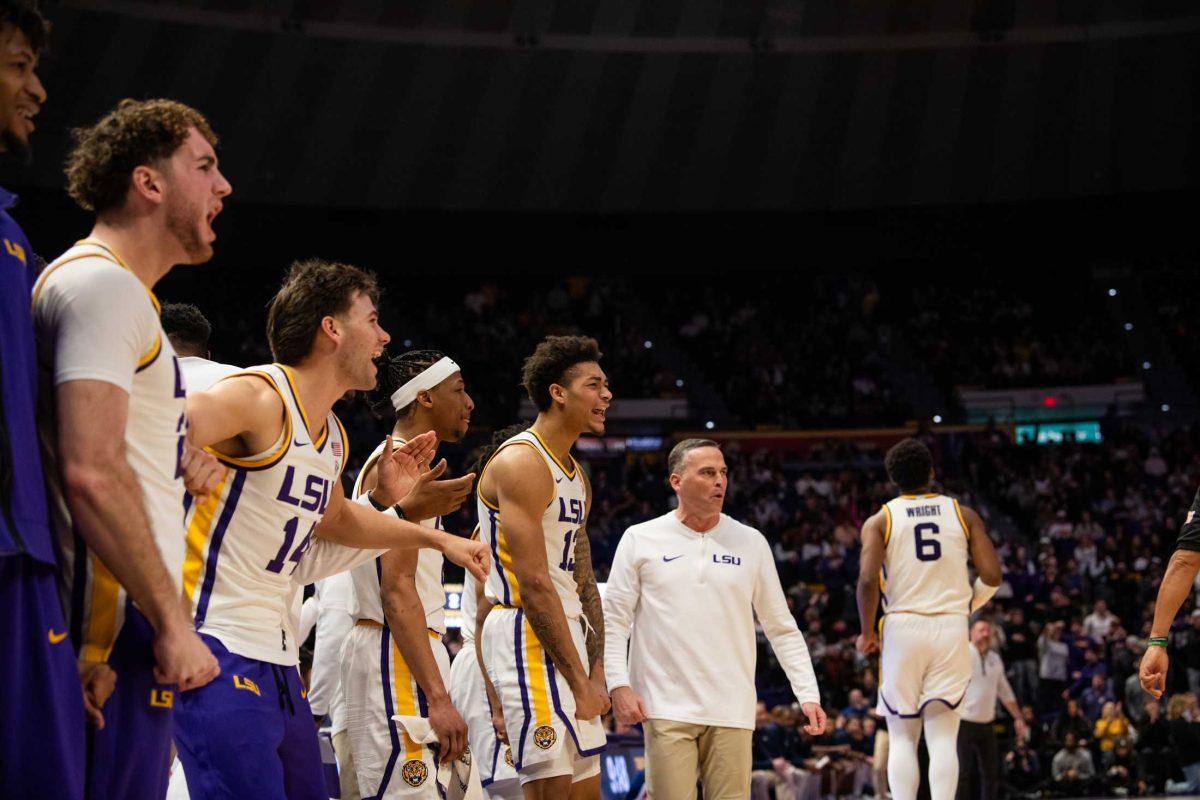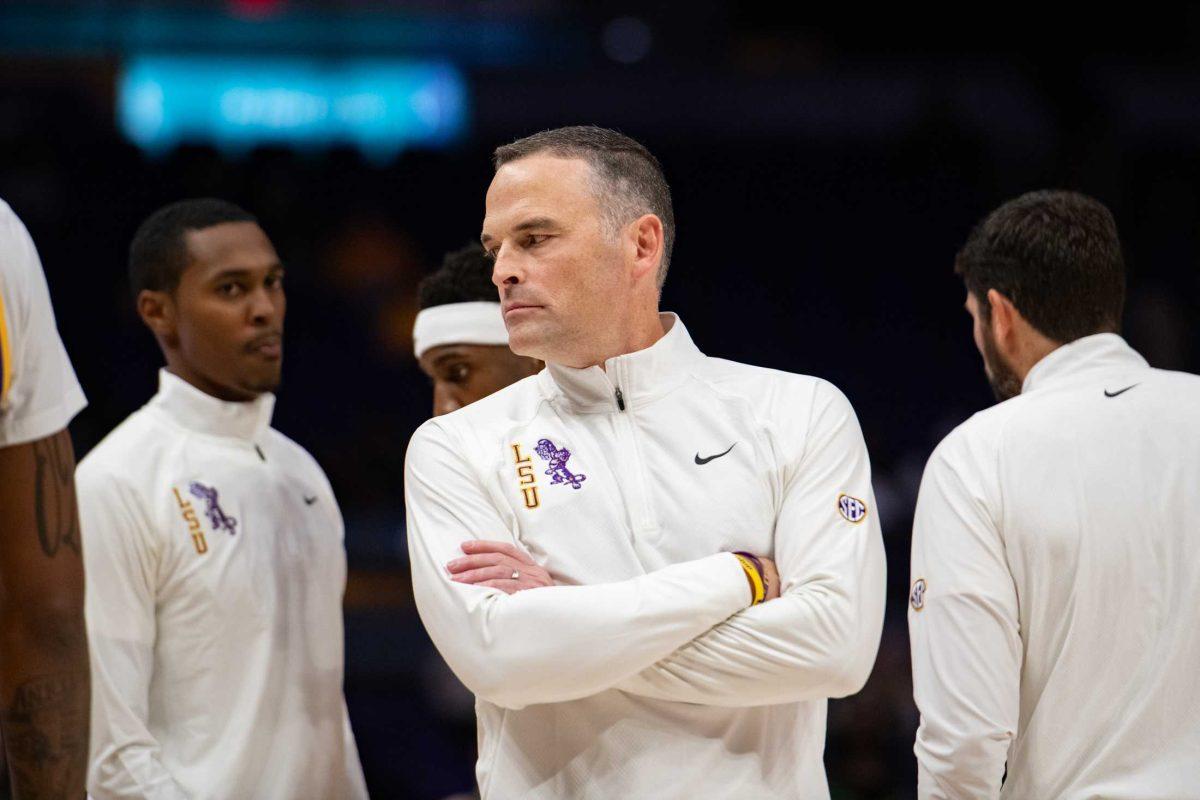Midway through the second half of a game practically already lost, LSU guard Trae Hannibal ran out in transition off a missed Auburn 3-pointer.
As he drove to the opposing free-throw line, he dished the ball to forward Jalen Reed, who went up for a lightly contested but relatively routine layup. Reed blew it, high off the backboard.
Auburn immediately pushed the ball ahead off the rebound and cashed in for a fast-break layup of its own.
It was another in a long series of blunders and mental mistakes that led to this point: a 73-45 lead for Auburn, a 28-point deficit for LSU.
It was the greatest deficit LSU had faced at any point this season. Greater than the Tigers faced at any point in their blowout loss to Syracuse or in their horrendous first half against Nicholls State.
As Auburn players celebrated, head coach Matt McMahon called a timeout. There were 11 minutes and 37 seconds left in the match, but the timeout was mostly a formality: the type of timeout you take because you can’t take it home with you.
It was a last-ditch effort to get something, anything, going to turn a demoralizing loss into at least something LSU could build on.
“It’s a sick feeling,” McMahon said. “But your team can go one of two ways at that point, and, really, you find out about your character and what you’re about.”
To their credit, the Tigers rallied out of the timeout. Sophomore wing Tyrell Ward promptly hit three consecutive 3-pointers, and Hannibal and Jordan Wright provided relentless energy to generate a stunning 28-8 run over the next nine minutes and cut the lead to eight.
Ultimately, though, Auburn slammed the door shut, eventually winning by 15.
The result wasn’t surprising. Auburn, a team that could potentially win the SEC and go deep into March Madness, is too good to let an opportunity like that slip away. However, not rolling over was a point of pride for LSU.
“I thought that was an important step for us as a team, and I was encouraged by that,” McMahon said. “We were able to build on that.”
Four days later, LSU had its next match, hosting Ole Miss. The Rebels were 15-1 and ranked No. 22 in the AP poll, but LSU put together a complete effort and pulled away in the second half for an impressive 89-80 win.
“In this league, you really can’t let two losses pile up, especially back-to-back,” Ward said. “We wanted to make an emphasis, we said at the beginning of the year, we don’t want to lose at home.”
That two-game stretch was incredibly informative for LSU as it tries to situate itself on the high end of the SEC’s hierarchy.
LSU’s performances proved a dual point: the Tigers are both vastly improved from last season and earlier this season and also not quite up to the level of the SEC’s elite.
For a nine-minute stretch, LSU looked capable of not only competing with but dominating Auburn, but Auburn held on for the win because it’s a superior team. Auburn is deeper, more balanced, more versatile and plays better team basketball than almost anyone in the country.
Maybe the gap isn’t immense, but it was clear in the final minutes that Auburn’s skill advantage took over. Of course, it was also that advantage that allowed it to build such a lead in the first place.
Though the win over Ole Miss was a solid performance, the Rebels’ No. 22 ranking was suspect due to a relatively soft non-conference schedule, which was backed up by a 26-point loss to Tennessee in its conference opener. The KenPom rankings have Ole Miss at No. 71 currently.
Ole Miss is a good team, but, like LSU, it isn’t yet at that upper echelon: not in head coach Chris Beard’s first year on the job.
The Tigers’ win over Ole Miss can then be taken as an indication that they could find themselves at the top of the second tier of the SEC rather than a serious contender for the conference crown.
Barring even more surprises, it’s unlikely that LSU will find itself competing with the SEC’s top class of Tennessee, Kentucky, Auburn and perhaps Alabama.
It isn’t an indictment to say that LSU isn’t up those teams’ level just yet. After all, the Tigers are just under two years removed from having zero scholarship players in the wake of former head coach Will Wade’s termination.
It’s been an uphill climb to get LSU back up to relevance. Last season, the Tigers put together one of the worst seasons in program history with a 14-game losing streak that was one short of the program worst of 15.
To open this season, LSU has had some disappointing performances but has looked like a much different team in the last seven games, where it has a record of 5-2, including 3-1 in conference play.
A tough, defensive identity is starting to be forged, and players are starting to gel.
The return of Jalen Cook has been important, but to say that’s been the only driving force of LSU’s turnaround would be wrong. Cook has been inefficient at times, shooting under 40% from the field in five of his seven games, and his playmaking has dropped off in conference play, with only two assists in his last three games.
All this to say, LSU has become a formidable team because of all-around effort, and the turnaround has been incredibly impressive.
Still, given where the Tigers come from, it isn’t a bad thing to say that LSU isn’t close to challenging Auburn, a program that’s won a game in four of the last five NCAA Tournaments. It’s a compliment that we can even come close to comparing the two.
Going forward, LSU certainly has the ability to make things interesting in the SEC and maybe even push for an NCAA tournament bid.
However, if the Tigers can’t reach those goals and continue to fall short of teams like Auburn, Tennessee and Kentucky, it shouldn’t be seen as a failure.
At the very least, the program is headed in the right direction and setting a successful foundation to build upon.










